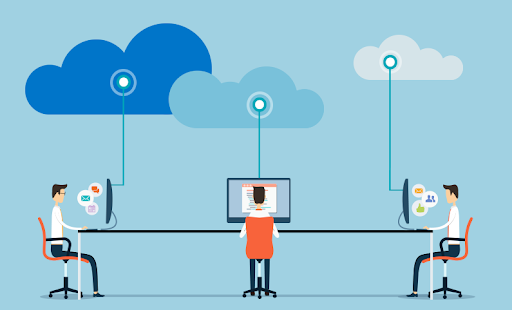DevOps and Cloud – Made for each other
Even though the affiliation between the DevCloudOps technology is frequently being undetermined and mistaken by novice outlook, they certainly are compatible with each other.
By the definition, DevOps is the affiliation of functions accomplished by process development group and system procedures or IT applications, more centered on operations and development. On the other hand, cloud being virtual in nature is all linked to services and technology.
Therefore, every organization that is seeking to revolutionize digitally needs to implement both the cloud computing and DevOps together as they both comprehend the process of application development and their prompt reaction to the necessity of organization units, the price of developing, and the requirement of swiftly falling of software consumers, experimenting, functioning and installing. The need for training in technologies and tools which contribute to practice DevOps with the cloud has increased as well. Similarly, as Linux is the widely used open-source operating system, organizations are focusing more and more on getting Linux DevOps training and Cloud Linux OS.
In this article, we will emphasize on how the DevOps game shapes the whole cloud development and development game and why the cloud and DevOps are built for each other.
Security in cloud and DevOps
Many companies, especially large organizations are taking steps to implement security as part of their infrastructure to prevent them from hacking.
And since the cloud and DevOps are the most sought after and fundamental platforms of almost every business development, many IT professionals incorporate security into these systems.
In order to stop future security violations, the DevOps specialists incorporate security codes (now DevSecOps) into the DevOps systems, while the cloud-focused companies develop their own applications, devices, and other security actions to look after their customers in the business. Therefore, the detection and deletion of errors can be made straightway without waiting for the process to finish. With the benefit of continuous trading and setback recovery can help restore the most significant ones even when the security is breached.
DevOps automation is an expeditiously fitting cloud hub. The fundamental nature of cloud computing provides an ideal focalized platform for automating the management, dispersion, and experimentation of DevOps. In addition to integration and continuous development tools, DevOps is being supported by many public and private cloud computing providers. This guarantees centralized authority and regulation as well as cost reduction affiliated with on-spot DevOps automation. Automation can be achieved in building and testing using Selenium and Maven which you can learn in Intellipaat DevOps Course Online.
Since the cloud requires maximum end-to-end automation. DevOps exercises bandwidth setup that can zealously oversee the cloud database and application assignment. DevOps assure minor system exposures and better protection by broadening the idea of the constant upgrade of the cloud platform.
Continuous Delivery Using cloud computing and DevOps
While Continuous delivery is another fundamental principle of DevOps, the cloud is particularly adapted for continuous use of distribution. To an exclusive chosen system, the modernization can be made and can be easily scripted. The cloud possesses no inbuilt stalling. In contrast to the latest preemptive monitoring with DevOps and the cloud, the feedback of operations has been observed in an outdated fashion in an old way. With DevOps and the cloud, Ops empowers Dev to get the job done, which was contrary in the old way where development had to undergo operations to get the job done by utilizing the conventional technique.
Continuous QA using Cloud and DevOps
Most quality assurance processes are automated through cloud service providers in order to carry out comparatively inexpensive production trials.
As part of the DevOps process, DevOps access to cloud computing permits developers to get past the quality control of virtual machines and implement cloud assets to guarantee the quality of applications prior to utilization.
Microservices with DevCloudOps
Microservices are a collection of small procedures that are assigned to complete a specific task in the application. Applications are thus designed and perform in a series of mircroservices through DevOps and the cloud-based approach. These microservices then perform through HTTP Application Programming Interface (API), an app that is a group of services.
Optionally, microservices can be operated independently and provide a separate channel to deliver new traits in active codebase. In order to avoid any problem with the new code, one can simply use it offline without terminating the program.
Combining DevOps with Cloud Technology equals to IT Revolution
DevOps speaks about processes and system enhancement, while cloud computing canvas all assistance and technology. It is necessary to comprehend how the cloud and DevOps strive together to support organizations accomplish their revolutionary goals. Companies that are implementing cloud-based operations have observed increases in customer fulfillment and reduction in downtime, as cloud optimizes operations’ accessibility and flexibility. However, if companies intend to cut down their groundwork expenses, they must incorporate cloud computing with DevOps in order to expand the universal limit.
In conclusion, there are five ways organization can jointly practice cloud computing and DevOps for a successful IT transformation:
- The agile approach to modernized developer procedures and development surroundings deliver assets to be stored swiftly.
- The smoothness of operation support and intricacies of the cloud can be lessened through automation and structure as code.
- Increasing top graded protection with automated and recurrent processes counteract faulty blunders and substantially assist in the configuration of safety restrictions from the start.
- Improve flexibility. One of the most prominent qualities of cloud computing is flexibility. Companies can have a user base of tenfold by designing single applications and making their resources accessible within minutes or even seconds. Teaming cloud with DevOps, flexibility emerged as an elemental part of application development, resulting in lower the budget of infrastructure and broadening worldwide scope.
Decreasing intermission by working nonstop in the cloud. Through automation, developers can create cloud applications that will boost customer gratification and company dependability.
Focus on Training of cloud computing and DevOps For the Business Success
In order to achieve innovative goals, the organization must provide DevOps and the cloud training to their key players as well as some mentoring. This includes custom training programs and web platforms to evaluate one’s cloud and DevOps skills that can be effective in real-world situations. Thus tech-savvy professionals must practice new, liable, countable, training procedures. Students and professionals should consider taking Azure DevOps training to get a better understanding of applications running on the Microsoft Azure cloud platform.
Final Words
The adaptability of cloud computing not only makes it the perfect mate of DevOps, it grants you the flexibility to explore DevOps processes. Despite the DevOps definition, cloud with DevOps can compel significant IT modifications that immediately result in business plans. Therefore the organizations need to understand the significance and underlining of the management of DevOps in the cloud in order to stimulate a considerable number of plausible profits along with downsized functional costs and upgraded agility.
Also, read Benefits of combining cloud and AI




